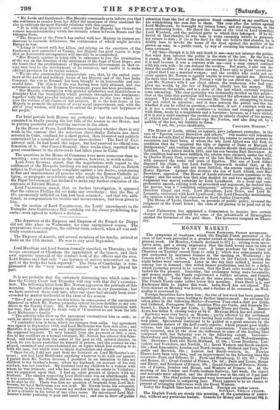The House of Lords, sitting on appeals, gave judgment yesterday,
in the case of "Egerton versus Brownlow and others." Our readers will remember that the seventh Earl of Bridgewater devised his estates to certain persons in succession and their heirs, of whom the late Lord Alford was the first, on condition that he "acquired the title or dignity of Duke or Marquis of Bridgewater," and voiding the use of the estates should that condition not be fulfilled Lord Alford died in 1851, and his son became Earl Brownlow. As the condition had not been fulfilled, the estates were claimed, under the will, by Charles Henry Cust, younger son of the late Earl Brownlow, who forth- with assumed the name and arms of Egerton. The son of 'Lord Alford disputed his claim; but Lord Justice Cranworth decided that, as the condition of the will had not been fulfilled, the estates vested in Charles Henry Egerton. Against this decision the son of Lord Alford, now Earl Brownlow, appealed. The House of Lords referred certain questions to the Judges ; and the result was that nine decided for and two against the will. -Judgment was moved yesterday by Lord Lyndhurst. In a lucid and com- prehensive speech, relying both on precedent and argument, he decided that the proviso was a "condition subsequent," adverse to public policy, and therefore illegal and void. Lord Brougham, Lord Truro, and Lord St. Leonardo, concurred with Lord Lyndhurst; the Lord Chancellor maintaining the opinion which he had expressed as Lord Justice Cranworth. The House of Lords, therefore, on grounds of public policy, reversed the judgment of the Court below ; the costs of all parties to be paid out of the estate.
Lord Palmerston has appointed a Commission to inquire into certain charges of cruelty preferred by some of the inhabitants of Birmingham against the Governor of the gaol there. The Governor resigned on Thurs- day.


























 Previous page
Previous page